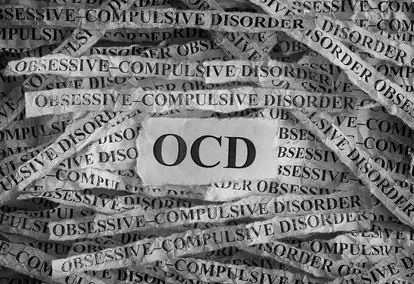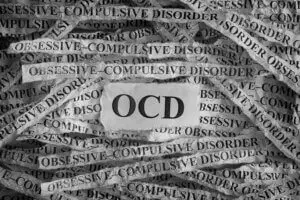Obsessions and Compulsions: What Is Obsessive-Compulsive Disorder?
June 27, 2023

Obsessive-compulsive disorder (OCD) is characterized by recurring unwanted thoughts, ideas, or sensations (obsessions). To get rid of the thoughts, people living with this disorder feel driven to do something repetitively (compulsions). They don’t enjoy or want to perform these compulsive behaviors, but they believe the behaviors will quell their anxiety. The repetitive behaviors, such as cleaning or checking on things, can significantly interfere with a person’s daily activities and social interaction.
Many people without OCD have distressing thoughts or repetitive behaviors. However, these do not typically disrupt daily life. For people with OCD, these thoughts are persistent and intrusive, and behaviors are rigid. Not performing and completing the behaviors commonly causes great distress, often attached to a specific fear of dire consequences to self or loved ones.
Many people with OCD know or suspect their obsessive thoughts are not realistic. But even when they know their thoughts are unrealistic, OCD greatly inhibits their ability to disengage from the obsessive thoughts or stop the compulsive actions.
Everyone experiences obsessions and compulsions at some point. For example, it’s common to occasionally double-check that the stove is off and the door is locked. But OCD is extreme. It can consume hours of a person’s day, getting in the way of normal life and activities. Symptoms often prevent a person from getting to school or work on time. Symptoms of OCD may come and go, ease over time, or worsen over time.
OCD can affect anyone. About 50 percent of people with OCD begin to have symptoms in childhood and adolescence. It’s rare for someone to develop OCD after the age of 40. OCD affects slightly more women than men. Some people may have a number of OCD symptoms but not meet the full criteria for this disorder.
Examples of Obsessions
- Fear of coming in contact with perceived contaminated substances, such as germs or dirt
- Fear of causing harm to self or someone else by not being careful enough or for fear of acting on a violent impulse
- Fear of making a mistake
- Excessive concern with morality (right or wrong)
- Need for order, neatness, symmetry, or perfection
- Need for constant reassurance
Examples of Compulsions
- Arranging things in a specific way, such as items in one’s pantry
- Bathing, cleaning, or washing hands over and over
- Collecting or hoarding items that have no personal or financial value
- Repeatedly checking things such as locks, switches, doors, and stoves
- Rituals related to numbers, such as counting, doing a task a specific number of times, or excessively preferring or avoiding certain numbers
- Saying certain words or prayers while doing unrelated tasks
Causing Factors
Researchers don’t know exactly what causes OCD, but several factors contribute to its development:
Genetics: Studies show people who have a biological family member with OCD are at a higher risk for developing the condition. The risk increases if the relative developed OCD as a child or teen.
Brain changes: Imaging studies have shown differences in the frontal cortex and subcortical structures of the brain in people who have OCD.
PANDAS syndrome: Pediatric autoimmune neuropsychiatric disorders associated with streptococcal infections (PANDAS) describes a group of conditions that can affect children who have had strep infections, such as strep throat or scarlet fever. OCD is one of these conditions.
Childhood trauma: Some studies show an association between childhood trauma, such as abuse or neglect, and the development of OCD.
It’s important to remember OCD is a mental health condition. Seeking help as soon as symptoms appear can help decrease the disruption to a person’s life. The prognosis of OCD can vary. People with OCD who receive appropriate treatment often experience increased quality of life and improved social, school, and work functioning.
Maintaining a healthy lifestyle — including getting enough quality sleep, eating healthy food, exercising regularly, and spending time with loved ones — can help in coping with OCD. Friends and family members can be supportive by understanding the struggles of their loved one. They can encourage visits to a therapist trained in treating OCD and help with practicing self-care.
Kathy Eichelberger completed a bachelor’s degree, a master of arts degree in marriage and family counseling, and a doctor of ministry degree in pastoral counseling from New Orleans Baptist Theological Seminary. She has been a Licensed Professional Counselor for more than 15 years and is passionate about helping people who are hurting and going through difficult life circumstances. Kathy has served as director of the Granberry Counseling Centers, a ministry of Louisiana Baptist Children’s Home and Family Ministries, since July 2009.
“About OCD.” International OCD Foundation. Accessed March 13, 2023. https://iocdf.org/about-ocd.
Fields, Lisa. “Obsessive-Compulsive Disorder (OCD).” WebMD. September 28, 2022. https://www.webmd.com/mental-health/obsessive-compulsive-disorder.
“Obsessive-Compulsive Disorder (OCD).” Cleveland Clinic. December 14, 2022. https://my.clevelandclinic.org/health/diseases/9490-ocd-obsessive-compulsive-disorder.
“Obsessive-compulsive disorder (OCD).” Mayo Clinic. March 11, 2020. https://www.mayoclinic.org/diseases-conditions/obsessive-compulsive-disorder/symptoms-causes/syc-20354432.
“What Is Obsessive-Compulsive Disorder?” American Psychiatric Association. Accessed March 13, 2023. https://www.psychiatry.org/patients-families/obsessive-compulsive-disorder/what-is-obsessive-compulsive-disorder.
Disclaimer: The information shared on this page is not meant to diagnose or treat a mental health condition. We encourage you to follow up with your health-care provider and seek a mental health professional for individual consultation and care.























